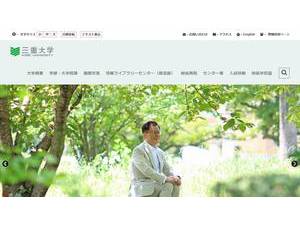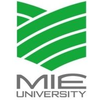
Overview
Founded in 1949, the Mie University (Mie Daigaku) is a non-profit public higher education institution located in the urban setting of the medium city of Tsu (population range of 250,000-499,999 inhabitants), Mie. Officially recognized by the Ministry of Education, Culture, Sports, Science and Technology of Japan, Mie University (MU) is a medium-sized (uniRank enrollment range: 7,000-7,999 students) coeducational Japanese higher education institution. Mie University (MU) offers courses and programs leading to officially recognized higher education degrees such as bachelor's degrees, master's degrees and doctorate degrees in several areas of study. See the uniRank degree levels and areas of study table below for further details. This 75-year-old Japanese higher-education institution has a selective admission policy based on entrance examinations. International students are welcome to apply for enrollment. MU also provides several academic and non-academic facilities and services to students including a library, housing, sports facilities, financial aids and/or scholarships, study abroad and exchange programs, as well as administrative services.
University Snapshot
Control
![]() public
public
Entity
![]() non-profit
non-profit
Size
![]() medium-sized
medium-sized
Selectivity
![]() not reported
not reported
University Identity
| Name | Mie University |
|---|---|
| Name (Non Latin) | 三重大学 |
| Name (English) | Mie Daigaku |
| Acronym | MU |
| Founded | 1949 |
| Motto | From Mie to the World! |
| Colours | Three greens of sky, waves and mountains |
| Screenshot |

|
| Video Presentation |
n.a.; please submit an official Mie University general video presentation. |
University Location
| Address | 1577 Kurimamachiyacho Tsu 514-8507 Mie Japan |
|---|---|
| Location Map and Satellite View | |
| +81 (59) 232 1211 | |
| +81 (59) 231 5692 |





Social Media
Introduction
Social media can be a powerful tool for Universities to communicate with current students, alumni, faculty, staff and the wider community. But how can social media be important for prospective students? Read our article about the importance of Social Media for universities and prospective students to learn more.
Social Media
uniRank publishes brief reviews, rankings and metrics of some Mie University's social media channels as a starting point for comparison and an additional selection tool for potential applicants.
Mie University's Facebook page
Mie University's X (formerly Twitter) page
Mie University's YouTube channel
Mie University's Instagram page
Mie University's main LinkedIn profile
n.a.